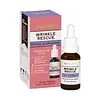What's inside
What's inside
 Key Ingredients
Key Ingredients

 Benefits
Benefits

 Concerns
Concerns

No concerns
 Ingredients Side-by-side
Ingredients Side-by-side

Water
Skin ConditioningPropanediol
SolventHelianthus Annuus Hybrid Oil
EmollientSodium Stearoyl Glutamate
CleansingBenzyl Alcohol
PerfumingCarrageenan
Cetearyl Alcohol
EmollientXanthan Gum
EmulsifyingCitric Acid
BufferingBakuchiol
AntimicrobialTocopherol
AntioxidantDehydroacetic Acid
PreservativeSodium Citrate
BufferingGlycerin
HumectantBiosaccharide Gum-1
HumectantGlycine Soja Oil
EmollientHibiscus Sabdariffa Flower Extract
Skin ConditioningGlyceryl Caprylate
EmollientSodium Anisate
AntimicrobialSodium Levulinate
Skin ConditioningSodium Benzoate
MaskingWater, Propanediol, Helianthus Annuus Hybrid Oil, Sodium Stearoyl Glutamate, Benzyl Alcohol, Carrageenan, Cetearyl Alcohol, Xanthan Gum, Citric Acid, Bakuchiol, Tocopherol, Dehydroacetic Acid, Sodium Citrate, Glycerin, Biosaccharide Gum-1, Glycine Soja Oil, Hibiscus Sabdariffa Flower Extract, Glyceryl Caprylate, Sodium Anisate, Sodium Levulinate, Sodium Benzoate
Ingredients Explained
These ingredients are found in both products.
Ingredients higher up in an ingredient list are typically present in a larger amount.
Bakuchiol is a plant-derived antioxidant (it's vegan!). It is often called the replacement for retinol although it is not part of the same family.
It has similar effects as retinol: skin smoothing, reducing discoloration, and preventing wrinkles. It does not cause as much irritation as traditional retinoids.
Bakuchiol works by breaking down free radicals and stimulating collagen production in skin.
Combining bakuchiol with retinol will not have adverse side effects. Studies show using them will just boost the benefits. Bakuchiol is also found to help stabilize retinol.
While bakuchiol does not make the skin more sun sensitive, we recommend wearing SPF on a daily basis.
Read more about traditional retinol
Learn more about BakuchiolTocopherol (also known as Vitamin E) is a common antioxidant used to help protect the skin from free-radicals and strengthen the skin barrier. It's also fat soluble - this means our skin is great at absorbing it.
Vitamin E also helps keep your natural skin lipids healthy. Your lipid skin barrier naturally consists of lipids, ceramides, and fatty acids. Vitamin E offers extra protection for your skin’s lipid barrier, keeping your skin healthy and nourished.
Another benefit is a bit of UV protection. Vitamin E helps reduce the damage caused by UVB rays. (It should not replace your sunscreen). Combining it with Vitamin C can decrease sunburned cells and hyperpigmentation after UV exposure.
You might have noticed Vitamin E + C often paired together. This is because it is great at stabilizing Vitamin C. Using the two together helps increase the effectiveness of both ingredients.
There are often claims that Vitamin E can reduce/prevent scarring, but these claims haven't been confirmed by scientific research.
Learn more about Tocopherol